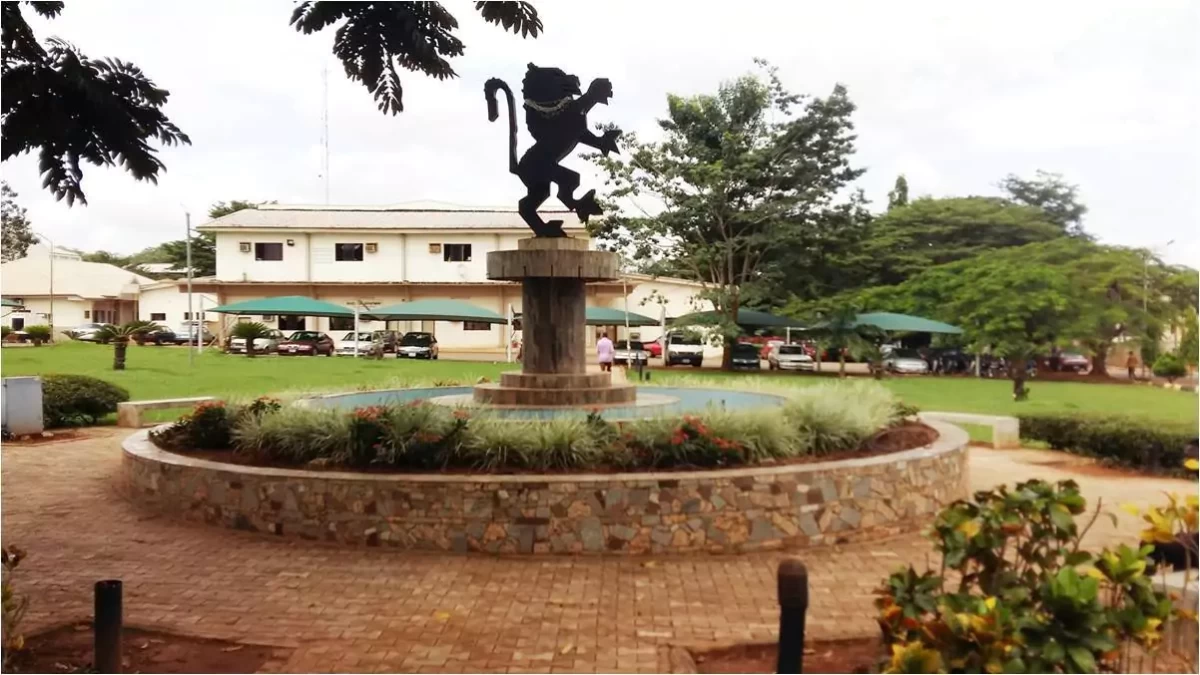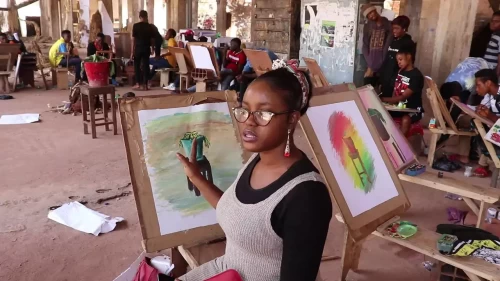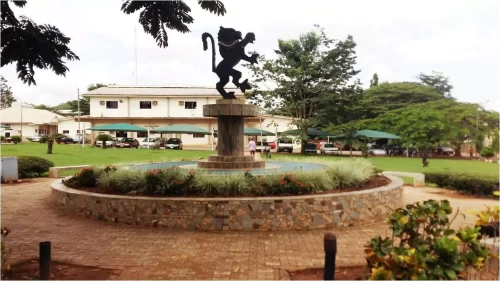About
The University of Nigeria, commonly referred to as UNN, is a federal university located in Nsukka, Enugu State, Eastern part of Nigeria. Founded by Nnamdi Azikiwe in 1955 and formally opened on 7 October 1960, the University of Nigeria has three campuses in Enugu State– Nsukka, Enugu, and Ituku-Ozalla.
The University of Nigeria is the first full-fledged indigenous and first autonomous university in Nigeria, modelled upon the American educational system. It was the first land-grant university in Africa and one of the five most reputed universities in Nigeria. The university has 17 Faculties and 102 academic departments. The university offers 108 undergraduate programs and 211 postgraduate programmes.
The university celebrated its 50th anniversary in October 2010, and would have celebrated its 60th anniversary in October, 2020 save for the COVID-19 pandemic.
| Acronym |
UNN |
| Nickname |
Lions and Lionesses |
| Motto / Slogan |
To Restore the Dignity of Man |
| Colour |
Green and white |
| Mascot |
Lion |
| Founded |
1955 |
| Departments |
102 |
| Location |
Nsukka, Enugu, Nigeria |
| Address |
Obukpa Rd, Nsukka, Enugu |
Mission
To place the university of Nigeria, Nsukka in the forefront of research and the development ,innovative, knowledge transfer and human resources development in the global academic terrain, while promoting the core values which will ensure the restoration of the dignity of man.
Vision
To create a functional, globally competitive and research focused university which is not just an Ivory Tower but responsive to the needs of the society while delivering world class education and knowledge.

Fees
Undergraduate Tuition
Indigenous Students
NGN 110,900 - NGN 120,650
International Students
NGN 5,362,350 - NGN 7,660,500
Postgraduate Tuition
Indigenous Students
NGN 124,950 - NGN 276,390
International Students
NGN 5,362,350 - NGN 7,660,500
Other Fees
Acceptance Fee: 30,000
Hostel fee
- Male hostel :20000
- Female hostel(regular):25000
- female hostel (standard):35000
Admission
Admission Rate (38%)
0%
38%
100%
Undergraduate Admission Requirement
1. General Requirements (For All Applicants)
- Must be at least 16 years old.
- Must have five (5) O-Level credit passes, including:
- English Language (compulsory)
- Mathematics (compulsory for most courses)
- Other relevant subjects based on chosen course
- All O-Level credits must be obtained in no more than two sittings.
2. UTME (JAMB) Candidates
- Must sit for the JAMB UTME and score at least 180 (or higher depending on the course).
- Must choose UNN as First Choice institution during registration.
- Must write the UNN Post-UTME screening test.
- Must upload O-Level results to both JAMB CAPS and UNN portal.
- Must meet the departmental cut-off mark after Post-UTME.
3. Direct Entry (DE) Candidates
- Must also register through JAMB Direct Entry and select UNN as First Choice.
- Must possess one of the following qualifications:
- A-Level passes in relevant subjects (e.g. IJMB, JUPEB)
- National Diploma (ND) or Higher National Diploma (HND) with at least Lower Credit
- NCE (with Merit or above)
- Must have required O-Level credits (same as UTME applicants).
- May be required to attend faculty screening or interview.
Supporting Documents
- JAMB Result Slip (showing your photo)
- UNN Post-UTME Acknowledgement Slip
- O-Level Result(s) (WAEC/NECO/NABTEB or GCE)
- Must include at least 5 credits including English and other relevant subjects
- Original and photocopies required
- Birth Certificate or Age Declaration
- Local Government Identification Letter
- UNN Admission Slip (from UNN Portal – if admitted)
- Evidence of Payment of Acceptance Fee and School Fees
- Passport Photographs (at least 4–6 recent colored copies, white background)
- Personal Data Form (completed on UNN Portal)
- Medical Fitness Certificate (from UNN-approved or government hospital)
- JAMB Admission Letter (from JAMB CAPS)
- UNN Admission Letter (from UNN Portal)
Postgraduate Admission Requirments
post graduate diploma
- Graduates of the University of Nigeria or other recognized Universities.
- Holders of credit (Upper credit) level passes at HND or its equivalent in relevant areas (for programmes in the Faculties of Agriculture; Business Administration; in the Departments of Political Science; Public Administration & Local Government; and Vocational Teacher Education.); and for Postgraduate Diploma in Electoral Administration Programme and Public Administration & Local Government; and Department of Vocational Teacher Education).
- Qualifications such as: A.I.B., ACCA., ACMA., ICAN., BEEC., C.P.A., etc may also be considered for admission.
- Candidates with professional qualifications including HND must have obtained 5 credits in WASC or GCE O/L including English and Mathematics for admission for degree courses in Business Administration. For Postgraduate Diploma in Architecture, as well as Geoinformatics and Surveying in particular, candidates with third class honours degrees in their respective disciplines are also eligible. (www.armorfenceco.com) For Postgraduate Diploma in Geoinformatics and Surveying in particular, candidates with third class 12 honours degrees in Geography, Geology and other Physical Sciences, as well as HND Upper Credit level passes in related fields, are also eligible.
- Candidates who hold qualifications other than the above which are acceptable to the Board of the School of Postgraduate Studies, and Senate of the University.
- Please note that in all cases, candidates should possess the minimum entry requirements for admission into the first degree programmes in their areas of interest for postgraduate studies. For the PGD in Civil Engineering, Mechanical Engineering, and Architecture, only candidates with University degrees in relevant areas need apply.
- Master’s Degree
The following shall qualify for Masters Degree admission: Graduates of the University of Nigeria or of other recognized Universities who have obtained the degree of Bachelor in the relevant disciplines with at least a good second class honours.
- Candidates with relevant Postgraduate Diplomas from the University of Nigeria with at least credit level passes.
- Candidates whose first degrees are unclassified but have scores of 50% or above.
- For M.Ed degree, candidates with at least, a good second class single honours degree in teaching subjects plus at least a merit level pass at Postgraduate Diploma in Education, or those who hold a third class honours degree in Education or a single honors degree in teaching subjects with at least 5 years postgraduate teaching experience, plus Postgraduate Diploma in Education passed at Merit level or above.
- For MPA, candidates should, in addition to (1) and (2) above, be serving administrative/managerial staff in the Public or Private sector with a minimum of two years post-qualification cognate experience.
- Holders of professional Fellowship qualifications such a FIMLT, FNILT, NIPR, or their equivalents obtained through examination. Candidates with the professional certificates listed above must have worked as Senior Technologist (s) or in equivalent position(s) for at least three years.
- Candidates who hold qualifications other than those listed above, which are acceptable to the Senate of the University.
Doctorate Degree (Ph.D)
- Candidates of the University of Nigeria or of other recognized Universities who have obtained the Masters degree appropriate for the proposed areas of study with a minimum of 3.50 grade point average on a 5-point scale or ‘B’ average provided that satisfactory research work formed part of the Masters degree programme.
- Demonstrated evidence of completed academic research will be an advantage.
Master’s/Ph.D Programme
- A candidate with first class honours or second class honours (Upper Division) from a recognized University may be admitted into a Masters/Ph.D programme.
- A candidate with Master’s degree from the University with a grade point average of 3.50 on 5-point or 3.00 on 4-point scale shall qualify for the Master’s/Ph.D or Ph.D.
Supporting Documents
1.O-Level Result(s)
- WAEC/NECO/NABTEB/GCE: Minimum of 5 credits including English Language
- Must be uploaded in JPEG format (scanned copy)
2.Degree Certificate or Statement of Result
- Bachelor’s Degree (for PGD or Master’s)
- Master’s Degree (for Ph.D. applicants)
3.NYSC Certificate
3.Discharge, Exemption, or Exclusion Certificate
- Mandatory for Nigerian applicants
4.Academic Transcript
- Must be sent directly from your previous institution to:
The Secretary, School of Postgraduate Studies, University of Nigeria, Nsukka
5.Not accepted if submitted by hand or the applicant
6.Referee Reports (3 required)
- Submit valid email addresses of three referees (at least one academic referee)
- The referees will be contacted to complete confidential reports
7.Birth Certificate or Age Declaration
8.Local Government Identification/Certificate of Origin
9.Passport Photograph
- Recent, clear, colored passport with white background (JPEG format)
10.Evidence of Application Fee Payment
- Remita payment receipt for the postgraduate form (?26,700)
11.Completed Online Application Form (printed copy from https://unnportal.unn.edu.ng)
How To Apply For Admission
For Undergraduate Admission
Step 1: Register for JAMB
- Visit a JAMB CBT center and register for the UTME or Direct Entry (DE).
- Choose UNN as your First Choice institution.
- Select the correct UTME subject combination for your course.
Step 2: Sit for UTME
- Write the JAMB exam and aim for a high score (UNN cut-off is usually 180+ depending on the course).
Step 3: Apply for UNN Post-UTME
- After JAMB releases results, visit https://unnportal.unn.edu.ng.
- Generate an invoice and pay the Post-UTME screening fee (usually ?2,000).
- Fill the online Post-UTME form and upload your O-Level results (WAEC/NECO/GCE).
Step 4: Write the Post-UTME Exam
- UNN will invite you to write a computer-based screening test.
- Monitor the portal or your email for your exam date and venue.
Step 5: Check Admission Status
- Visit the UNN portal and JAMB CAPS to check if you’ve been offered admission.
- Accept the offer on JAMB CAPS to confirm it.
Step 6: Pay Acceptance Fee & Register
- Once admitted:
- Pay the acceptance fee on the UNN portal.
- Upload required documents (O-Level, birth certificate, passport photo, etc.).
- Proceed with online clearance and registration.
For post graduate
step1. Check Eligibility
- Ensure you meet academic and O-Level requirements.
- You must have your NYSC certificate and transcript ready.
Step 2: Generate Payment Invoice
- Visit https://unnportal.unn.edu.ng
- Click “PG Application”, fill in details, and generate invoice via Remita.
Step 3: Pay Application Fee
- Pay N26,700 at any bank or online using Remita.
- Save your RRR number.
Step 4: Complete the Application
- Return to the portal, enter your RRR, and fill out the form.
- Upload:
- O-Level results
- Degree certificate
- NYSC certificate
- Passport photo
- Birth certificate & LGA ID
Step 5: Add Referees
- Submit emails of 3 referees (2 academic preferred).
- They will be contacted to submit recommendation letters.
Step 6: Submit Form & Print
- Review, submit, and print your form and acknowledgment slip.
Step 7: Send Your Transcript
- Ask your school to send your official transcript directly to:
The Secretary, School of Postgraduate Studies, UNN.
Step 8: Track Your Application
- Monitor email and the UNN portal for screening dates and admission updates.
Admission Contacts
Email: [email protected]
Phone : +23442771911
Apply For Admission
Vice Chancellor
Professor Oguejiofo T. Ujam attended the College of the Immaculate Conception, Enugu, Enugu State, Nigeria. He obtained a B.Sc. (Hons) in Industrial Chemistry(1998) and a Ph.D. in Inorganic Chemistry (2011) from the University of Nigeria and the University of Waikato, Hamilton, New Zealand respectively. Prof. Ujam started his career as Chemistry academic in November 1999 as the pioneer coordinator
... read more of the Industrial Chemistry program at Madonna University, Okija, Anambra State. He joined the services of the University of Nigeria in September 2003 as a Graduate Assistant and was appointed an Assistant Lecturer in March 2006. Ujam had tutelage, extensive teaching and research experiences under world-leading academics in chemical sciences, viz Australia (University of Waikato, Hamilton, New Zealand), Asia (National University of Singapore, Singapore), and North America (University of Victoria, Victoria, Canada).
History
A law to establish a university in the Eastern Region of Nigeria was passed on 18 May, 1955. This date marks the formal beginning of the history of the University of Nigeria, with the enactment of a legislation by several Nigerian leaders, inspired particularly by the then Premier of the Eastern Region, Dr. Nnamdi Azikiwe.
One of the first steps taken by the Eastern Nigeria Government towards the implementation of its commitment was an invitation to both the United States of America and the United Kingdom to send advisers to help in the planning of physical and educational aspects of the proposed university.
Under the joint auspices of the Inter-University Council ... read more
for Higher Education and Overseas and the International Co-operation Administration (now the United States Agency for International Development), J.W. Cook, Vice-Chancellor of the University of Exeter, Dr. John A. Hannah, President of Michigan State University and Dr. Glen L. Taggart, Dean of International Programs at the same university, came to Nigeria in 1958. The team surveyed the site at Nsukka, and extensively investigated a great variety of factors pertinent to the establishment of a new university.
The results of their efforts were contained in a white paper issued by the Eastern Nigeria Government on 30 November, 1958. They had recommended “that the development of the University of Nigeria based upon the concept of service to problems and needs of Nigeria, is a desirable project and one that should receive support from any source which could help to make it a sound endeavor”.
They further recommended that a provisional council be established to “draw upon the technical and consultative resources available throughout the world for help in planning the institution”.




